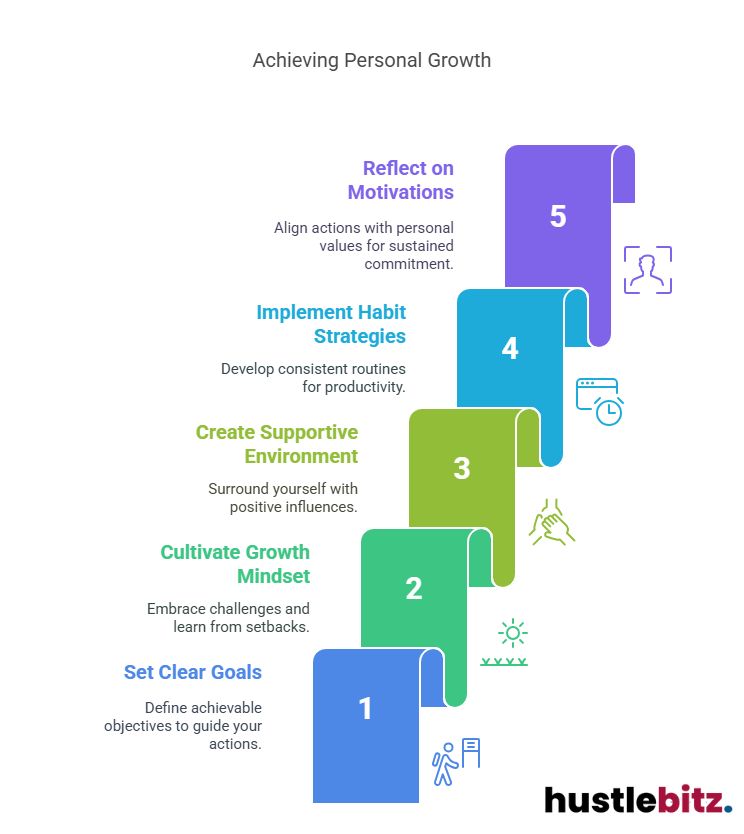Sustaining long-term motivation hinges on cultivating consistent habits and fostering an intrinsic drive. Establishing clear, measurable goals is essential for channeling efforts effectively. A growth mindset allows individuals to view challenges as opportunities for development. Building healthy habits, reinforced through accountability partnerships, promotes resilience against setbacks. Surrounding oneself with positive influences and setting a conducive environment further supports motivation. Additionally, reflecting on personal values ensures goals resonate deeply, enhancing commitment. By understanding these critical components, individuals can achieve sustained motivation that fuels consistent progress in their endeavors. Explore these strategies further to unlock greater potential.
Key Takeaways
- Establish clear, achievable goals and break them into manageable tasks to maintain focus and direction.
- Cultivate a growth mindset to embrace challenges and learn from setbacks, enhancing resilience.
- Create a supportive environment by surrounding yourself with positive influences and like-minded individuals.
- Implement robust habit formation strategies to develop consistent routines that reinforce productive behaviors.
- Regularly reflect on your motivations and align them with personal values to sustain commitment and drive.

Understanding Long-Term Motivation

Understanding long-term motivation involves recognizing that sustained drive is often rooted in consistent habits rather than fleeting bursts of enthusiasm. To harness this power, one must cultivate intrinsic motivation, which originates from within and fuels a relentless pursuit of excellence. This internal drive transcends the superficial allure of extrinsic rewards, ensuring that the journey remains invigorating despite inevitable challenges.
A critical component of sustaining motivation is emotional resilience. In the face of setbacks, those who possess this quality can rebound with greater determination, viewing obstacles as opportunities for growth. Developing emotional resilience requires rigorous self-discipline, enabling individuals to maintain focus on their goals even when external circumstances threaten to derail progress.
Goal setting emerges as an essential strategy in this pursuit. Clear, measurable objectives provide a roadmap for achievement, channeling effort and resources effectively. When individuals set ambitious yet attainable goals, they create a compelling vision of success that reinforces their intrinsic motivation.
Moreover, self-discipline acts as the backbone of sustained motivation. It empowers individuals to adhere to their commitments and establish habits that align with their aspirations. By consistently demonstrating self-discipline, one builds momentum that fosters a powerful cycle of motivation, reinforcing the desire to achieve.
The Role of Consistency
Consistency serves as the cornerstone of long-term motivation, transforming sporadic efforts into a reliable pathway toward achieving one’s goals. At its core, consistency facilitates habit formation, ensuring that productive behaviors become ingrained within an individual’s daily life.
By establishing a robust routine, one can optimize their efforts, allowing for focused and efficient use of time and resources.
Discipline is a critical component of this process; disciplined practice not only reinforces habits but also breeds resilience in the face of challenges. Those who commit to a consistent approach often witness incremental progress, where small, deliberate actions compound over time to yield significant results.
This gradual advancement is crucial, as it instills a sense of accomplishment and further fuels motivation.
Moreover, engaging in accountability partnerships can amplify the benefits of consistency. By aligning with like-minded individuals who share similar goals, one can foster a supportive environment that encourages perseverance.
Accountability serves as a powerful motivator, prompting individuals to adhere to their commitments even when external circumstances may tempt them to deviate.
Cultivating a Growth Mindset
Cultivating a growth mindset involves embracing challenges as opportunities for learning and development, fostering resilience in the pursuit of long-term motivation. This perspective not only empowers individuals to confront obstacles with confidence but also positions them to extract valuable insights from every experience. By viewing setbacks as growth opportunities, one can enhance their capacity to adapt and thrive.
To effectively cultivate a growth mindset, consider the following strategies:
- Embrace Challenges: Actively seek out tasks that push your limits, recognizing that discomfort is a sign of growth.
- Foster Curiosity: Cultivate an inquisitive nature by asking questions and exploring new ideas, which can lead to innovative solutions and deeper understanding.
- Celebrate Progress: Acknowledge even the smallest victories along your journey. Celebrating progress reinforces positive behavior and builds momentum.
- Learn Resilience: Develop the ability to bounce back from setbacks by reflecting on what went wrong, adjusting your approach, and moving forward with renewed vigor.
Building Healthy Habits

How can individuals effectively establish healthy habits that support their long-term motivation and overall well-being?
The foundation of sustained motivation lies in the implementation of robust habit formation strategies. Begin by optimizing your daily routine to create a structured environment that fosters productivity and discipline. Identify key activities aligned with your goals and integrate them seamlessly into your schedule, ensuring that they become non-negotiable components of your day.
Furthermore, accountability partnerships can amplify your commitment to these habits. Collaborating with a like-minded individual not only fosters a sense of responsibility but also provides mutual support, encouraging perseverance during challenging times. Establish regular check-ins to evaluate progress and recalibrate as necessary, reinforcing your shared objectives.
Incorporating reward systems is another powerful strategy to solidify these healthy habits. By setting tangible rewards for achieving milestones, you create positive reinforcement, which enhances your motivation and commitment to the process. This approach transforms the journey into a more gratifying experience.
Additionally, be mindful of environmental triggers that can either promote or hinder your habit formation. Design your surroundings to eliminate distractions and facilitate your desired behaviors. For instance, if your goal is to exercise regularly, ensure that workout gear is easily accessible and visible.
Finding Your Why

Identifying a clear and compelling reason for pursuing your goals is essential for sustaining long-term motivation and maintaining focus on your journey. This ‘why’ serves as a guiding light, illuminating your path through challenges and distractions. Understanding your motivations empowers you to align your actions with your personal values, fostering intrinsic motivation that fuels your pursuit of success.
To effectively find your why, consider the following:
- Personal Values: Reflect on what truly matters to you. Align your goals with your core beliefs to enhance your commitment.
- Life Purpose: Explore the bigger picture of your existence. A clear life purpose can provide the ultimate motivation for your endeavors.
- Passion Projects: Identify projects that ignite your enthusiasm. Engaging in activities you are passionate about can significantly boost your motivation levels.
- Goal Alignment: Ensure that your goals are in harmony with your values and purpose. This alignment creates a powerful synergy that propels you forward.
Surrounding Yourself With Positivity

Surrounding yourself with positivity is crucial for maintaining long-term motivation and resilience in the face of challenges. The environments we inhabit significantly influence our mental state and productivity. By cultivating positive environments, you set the stage for success, enabling yourself to thrive rather than merely survive.
Supportive relationships act as a formidable foundation for your journey towards achieving your goals. Engaging with individuals who uplift and empower you fosters a sense of belonging and reinforces your commitment to your aspirations. These relationships are vital; they not only provide encouragement but also serve as a sounding board for your ideas, enhancing your decision-making capabilities.
Moreover, the content we consume shapes our thoughts and attitudes. By immersing yourself in uplifting content—be it books, podcasts, or motivational speeches—you actively feed your mind with inspiration that propels you forward. Complementing this with gratitude practices can further enhance your outlook, transforming challenges into opportunities for growth and learning.
Lastly, seek out inspiring mentorship. A mentor can provide invaluable insights, guiding you through complexities while modeling the behaviors you aspire to emulate. Their experience can illuminate paths that may not be apparent, empowering you to navigate obstacles with confidence.
Final Thoughts
Sustaining long-term motivation requires a holistic approach that combines clear goal setting, habit formation, a growth mindset, and a positive environment. By aligning your actions with personal values and surrounding yourself with support, you create a foundation for consistent progress. Understanding your “why” and embracing challenges as growth opportunities allow you to maintain focus and resilience in the face of adversity. With the right mindset and strategies, you can build the motivation necessary for long-term success and fulfillment.




